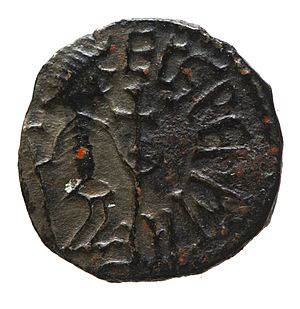Ecgbert of York facts for kids
Quick facts for kids Ecgbert |
|
|---|---|
| Archbishop of York | |

Coin of Archbishop Ecgbert
|
|
| Appointed | 732 |
| Reign ended | 19 November 766 |
| Predecessor | Wilfrid II |
| Successor | Æthelbert |
| Orders | |
| Consecration | about 734 |
| Personal details | |
| Died | 19 November 766 |
| Buried | York Minster |
| Parents | Eata |
Ecgbert (died November 766) was an important church leader in England during the 8th century. He is famous for setting up the archdiocese of York in 735. An archdiocese is like a large church area led by an archbishop. His brother became king of Northumbria in 737. Together, they worked on many church matters. Ecgbert also wrote letters to famous people like Bede and Boniface. He even wrote a special rulebook for his clergy, who are church officials.
Contents
Ecgbert's Early Life
Ecgbert was the son of a man named Eata. His family was related to the founder of the kingdom of Bernicia. His brother, Eadberht, ruled as king of Northumbria from 737 to 758. Ecgbert traveled to Rome with another brother. While in Rome, he became a deacon, which is a type of church minister. Some people say Ecgbert was a student of the famous scholar Bede. However, it might just mean he studied Bede's writings, not that Bede taught him directly.
Becoming Archbishop of York
Around 732, Ecgbert was chosen to lead the church in York. His cousin, Ceolwulf, who was the king of Northumbria, made this appointment. In 735, Pope Gregory III gave Ecgbert a pallium. This was a special wool band that showed he had the authority of an archbishop.
After his brother Eadberht became king, they worked closely together. They even had rules from the papacy (the Pope's office) about not giving church lands to regular people. They also tried to fix problems between the church and the king's government. You can see their teamwork on some of Eadberht's coins. These coins show Ecgbert's face on one side.
Ecgbert faced issues with monasteries in his area. Some families were setting up monasteries on their land. This was a way to make their land "book-land". Book-land was church property and didn't have the same duties to the king as other lands. By doing this, families could keep using their land without having to pay taxes or provide services to the king.
Ecgbert's Famous School
Ecgbert started a school in York that became very well-known. A modern historian, Peter Hunter Blair, believes it was as good as, or even better than, the famous monasteries at Wearmouth and Jarrow. This school taught not only future church leaders but also the children of important noble families.
Ecgbert also created an amazing library at York. Peter Hunter Blair called it "a library whose contents were unequalled in the western Europe of its day." Many important students attended this school. One famous student was Alcuin, who later became a great scholar himself. Other students, like Ludger and Aluberht, also studied there before becoming bishops in Germany.
Letters from Important People
Ecgbert exchanged letters with other important figures of his time.
Letters from Bede
The famous scholar Bede wrote a letter to Ecgbert in 734. This letter, called the Epistola ad Ecgberhtum episcopum, talked about issues with monasteries and large church areas. Bede told Ecgbert to study a book by Gregory the Great called Pastoral Care. He also pointed to Aidan and Cuthbert as examples of excellent bishops. Bede's main message was for Ecgbert to make his church more like Gregory the Great's original plan. Bede also suggested dividing up the very large church areas, but Ecgbert did not do this.
Letters from Boniface
Boniface, another important church leader, also wrote to Ecgbert. He asked Ecgbert for help against Æthelbald of Mercia, a powerful king. Boniface also requested some of Bede's books from Ecgbert. In return, Boniface sent wine for Ecgbert to enjoy with his fellow church leaders. On another occasion, Boniface sent Ecgbert a cloak and a towel as gifts.
Ecgbert's Writings
Ecgbert wrote an important book called the Dialogus ecclesiasticae institutionis. This book was a legal code, or a set of rules, for the clergy. It explained the correct ways to handle many church matters and how clergy should behave in society. It is believed that Ecgbert wrote this book after 735. Because Ecgbert was the most senior archbishop in England at the time, this book might have been meant for the entire church in England, not just his own area.
Other writings were sometimes said to be by Ecgbert in the Middle Ages. However, modern experts do not believe he actually wrote them.
Death and Legacy
Ecgbert passed away on November 19, 766. He was buried in his cathedral in York. After his death, Ecgbert was known as an expert on church law and rules, both in England and in Europe. Alcuin, his former student, also said that Ecgbert was known for teaching singing. Historians like D. P. Kirby and Henry Mayr-Harting have called him a "great" archbishop and a key person in shaping the English church in the 8th century.
 | Bessie Coleman |
 | Spann Watson |
 | Jill E. Brown |
 | Sherman W. White |

